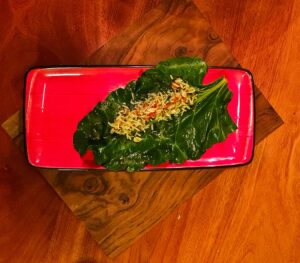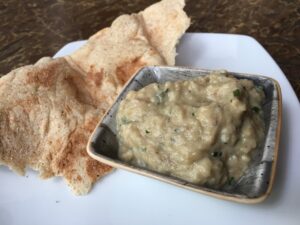I’ve only recently come to know and love my husband’s elderly cousins, Grace and Khawla. My friendship with them was born in the kitchen and fostered at the table – the location that for me symbolizes the Palestinian family; it is the place where bread is broken and passed around, literally. And the dish that symbolizes my friendship with Saleh’s cousins is siliq mahshi, stuffed Swiss chard. This seasonal green grows wild in most gardens or empty plots in Palestine. It regenerates quickly and can be a kitchen staple from autumn to spring. Just throw a bag of Swiss chard seeds on some dirt, reap the rewards, and enjoy it with your family!
As we are from the dwindling population of Ramallah’s founding Christians, December is a festive month, and this dish is found on our table every Friday. First, we harvest the Swiss chard from the organic rooftop garden above our Café La Vie. It is enough for two dishes, so I’ll share both recipes!
I break off the Swiss chard stems at the plant’s base – and it continues to regrow. Even though we have an organic garden, I wash the leaves, soaking them in salty water to rinse off any pollution or fertilizer. Then, I break off the stems and leave them for Swiss chard mtabbal, a dip introduced to me by my wonderful neighbors Im-Nabeel and Im-Bashar.
To start, Grace, Khawla, and I come together in the kitchen. Grace brings the water to a near boil and submerges the leaves for a minute to wilt them; they become soft but remain solid enough to handle and roll. As she does this, I help Khawla prepare the rice mixture by soaking the rice in water.
Since we make this vegetarian, we add extra spices and vegetables to our stuffing for flavor. For the rice, I blend the tomatoes in the food processor and add the parsley, onions, and garlic cloves.
Grace stirs this into the drained rice and adds salt, a heaping tablespoon of cinnamon, ground coriander, black pepper, and garlic and onion powder, squeezing a lemon into the mix.
Now the fun (read: labor) begins.
Each of us places a leaf into the palm of our hand, drapes it over our fingers, and places a line of rice down the middle. Unlike warak dawali (vine leaves), Swiss chard leaves don’t need to be wrapped perfectly; we simply roll them. Then, after gently squeezing the rolled leaf to let the juice drop back into the bowl, we place our rolled leaves in a pot and start over. Once the pot is filled, we pour the remaining juices over the top. We mix the hot water with tomato paste and salt and pour the mixture over the leaves.
We bring the covered pot to a boil and turn down the heat to let it simmer for an hour.
When the leaves are tender and the rice fully cooked, we turn off the heat. We give the pot a good hard shake to make sure the leaves don’t stay stuck to one another, otherwise we wouldn’t be able to take them out without ripping them. We pile our plates high and together enjoy the most memorable moments of the week.
Siliq Mahshi
2 kilos of Swiss chard leaves (remove the stems and set them asid to use for Swiss chard mt’abal)
1½ cups white rice, rinsed and soaked
6 large tomatoes
1 large onion
8 garlic cloves
2 bunches of parsley
1 tbsp each of cinnamon, ground coriander, black pepper, garlic powder, and onion powder
Salt and pepper to taste
3 tbsp tomato paste
1 liter boiling water
Swiss Chard Mtabbal
Chop around 15–20 stems of Swiss chard into 2-inch-long pieces, place them into a pot of boiling water, and cook until soft (about 10 minutes). Drain the water and mash the stems. Add 2 to 4 tablespoons of tahini, depending on taste; I usually start with a bit and keep tasting until I like it. Squeeze a lemon into the mix, and sprinkle on salt to taste. Mix it all up and eat with bread.



